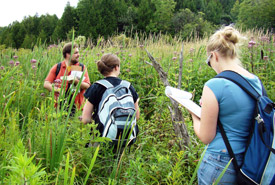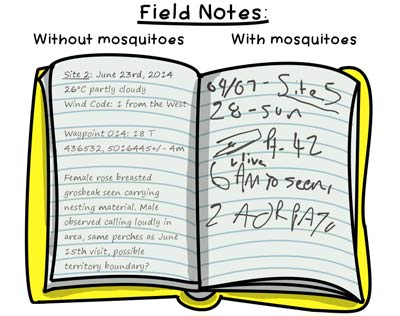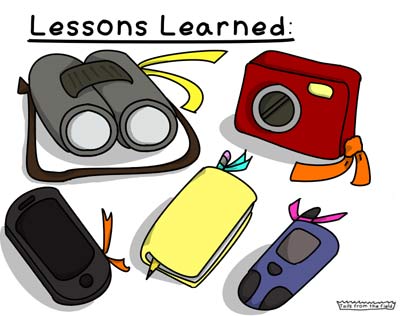Five tips to avoid #fieldworkfail

NCC Ontario staff identify meadow marsh plants, Lower Maitland River Valley, Ontario (Photo by NCC)
If you haven’t already explored the hilarious misadventures of field scientists and conservation workers through the hashtag #fieldworkfail, it is well worth a look. Fieldworkers are sharing incredibly honest and amusing anecdotes of when their fieldwork…didn’t go quite as planned.
Once you’re done guffawing, here are five tips to avoid #fieldworkfail, so you can have a bit more #fieldworkwin right now, or in the field season to come!
Bring appropriate clothing

Wear appropriate field clothing (Comic by Liv Monck-Whipp/Tails from the Field)
When the weather is lovely, it can be hard to understand why you wouldn’t wear shorts and a tank top? Or flip flops? (Hint: biting insects! Or fields of thorny shrubs. Or massive sunburn.) Or maybe rubber boots seemed like a good idea, before the blistering heat and rocky terrain kicked in.
Appropriate clothing is going to depend on three things: what you’re doing, what the weather/terrain is like and how much you value that particular piece of clothing staying clean and un-shredded. When in doubt, ask people who are doing similar work in the area what they generally wear for a typical day out, and if they bring any extra gear, like raincoats or emergency sweaters. Layering is often wise because you can instantly adjust your clothing to meet the weather du jour. Stashing a pair of dry socks never hurts, either.
Wearing appropriate clothing in the field not only makes work way more comfortable and enjoyable, it can be a serious safety precaution. Overheating, hypothermia, sprained ankles, sunburns, exposure to insect-borne diseases can all be the result of inappropriate field clothing. Stay safe and field-fashionable! (And save your fancy pants for a non-field day.)
Know your field site inside and out

Map out your field site (Comic by Liv Monck-Whipp/Tails from the field)
Before you even get into your field site, you should know how to get out. Note where any roads or trails are (sometimes this can save you hours of bushwacking!), or big waterbodies/wetlands that might be difficult to get around. It can be easy to get turned around, so having a few landmarks in mind can help re-orient you quickly.
Or, as happened to a coworker of mine once, you can circumnavigate a momma bear if you need to.
Knowing your field site can take some time, but it will also pay off in being able to notice changes that have occurred, or how weather can turn a brook you could hop over into a flooded river.
Take good notes

The difference between taking notes in areas without and with bugs (Illustration by Liv Monck-Whipp/Tails from the Field)
Taking good notes is essential for effective fieldwork. Data collection is often first priority while out there, and it is really easy to collapse at home after a long day and forget all the important details! It can take 15 seconds to jot down an extra note, or hours to return to the same spot to check again. Save yourself the time.
Checklists and field sheets are a great way of ensuring that nothing essential gets missed when taking notes. Often though, it is the out-of-the-ordinary observations that may be important to prevent #fieldworkfail later on. Noting that a small hole is developing on a dam, or that foxes have been much more active around the site lately, may lead to preventing some serious problems later on.
Staff may change from year to year, especially for long-term projects, so any important trends or occurrences you’ve noticed might not get passed along unless you’ve written them down somewhere!
One last thing: work on your penmanship. Your co-workers will appreciate it. Trust me.
Flagging tape on everything

If something is important, slap a fluorescent bow tie on it! (Graphic by Liv Monck-Whipp/Tails from the Field)
Flagging tape is one of the best inventions for field work, right up there with duct tape, and rite-in-the-rain notebooks. If something is important enough to not lose, it’s important enough to slap a fluorescent bow tie on. Flagging a path out in unfamiliar territory can be a lifesaver!
Flagging dangerous hazards on a frequently used dirt road can also prevent unpleasant, muddy, “heaving the car out of the ditch” incidents. Not that I would know anything about that.
Have a good sense of humour

Poking of poop with bare hands not recommended (Comic by Liv Monck-Whipp/Tails from the Field)
Lastly, but not least, have a sense of humour! If you’re going to do fieldwork, chances are you’re going to get dirty. You’re going to get sweaty, and at one point or another, things are totally not going to go according to plan. At. All.
Being able to cope with these challenges by cracking jokes and taking pitfalls in stride is a great quality in any fieldworker!


